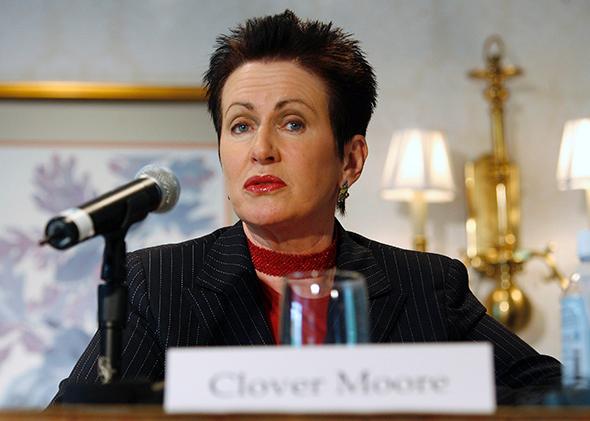In the United States, if the idea of letting corporations vote in elections gets talked about at all, it’s usually as the absurd logical end point of treating companies like people.
Not so in Australia. In many cities across the country, business owners and landlords have long enjoyed the right to participate in local elections, even if they live out of town. (Imagine if a pizza parlor owner from New Jersey could vote in the New York City mayor’s race because he had a location in Manhattan, and you’ve got the picture.) This month, an intriguing political fight has been brewing over whether businesses in Sydney should be required to vote in municipal elections. At the moment, conservatives are pushing a controversial bill that would compel business owners and landlords to cast ballots in city council and mayoral races—a move widely viewed as an attempt to oust the current mayor, Clover Moore, a popular progressive.
The controversy, to be clear, isn’t over whether businesses should still get the vote. It’s just about whether they should be forced to vote.
As Marian Sawer and Peter Brent recounted in a 2011 paper, Australia’s odd tradition of corporate enfranchisement is a holdover from its 19th-century colonial days. Early in the country’s history, men could vote wherever they owned property or a business, or paid enough rent. Everyone else was barred from the ballot box. In the 1850s, the country moved to universal male suffrage, and over the next half-century or so, property and business owners lost the ability to vote in multiple jurisdictions during federal elections. But in local politics, the right of out-of-town business owners and landlords to cast a ballot lingered on.
“One might assume that by now property votes would be a thing of the past, safely consigned to the rubbish-bin of history, along with the exclusion of women, Indigenous Australians and the poverty-stricken from the franchise,” Sawer and Brent write. “This is indeed assumed by most people, but in fact property votes are still flourishing everywhere in local government in Australia except in Queensland and the Northern Territory.”
Why did voting rights for businesses survive? Because they pay local property taxes. According to Graeme Orr, a law professor at the University of Queensland, they appealed to the American rhetoric of “no taxation without representation.” Australians also tended to see “local governments as service providers more than vibrant democratic units,” Orr explained in an email.
Even today, local city government is a relatively low-stakes affair in Australia. Major responsibilities such as policing and education are handled by the state (in Sydney’s case, New South Wales). Meanwhile, in a tradition inherited from the British, many metro areas are split into numerous, hyper-local councils, each with their own mayor—in Sydney, there are more than two dozen. The dustup over mandatory voting is centered on the City of Sydney, which is essentially the downtown business district and traditionally hasn’t been particularly residential. “You’d have to imagine, say, the Battery Park end of Manhattan having its own council—but then you’d have to imagine a culture in Australia where, from the early 20th century until recently, the central business districts didn’t have much population,” Orr said. Whereas greater Sydney has more than 4.5 million residents, the City of Sydney claims about 187,000.
Still, local councils do wield some powers, including the ability to set zoning and development rules, embark on modest infrastructure projects, and collect property taxes (or “rates”—the City of Sydney is expected to scoop up about 200 million Australian dollars from businesses in 2014-15). While she has easily won three terms in office, Clover Moore has managed to enrage conservatives by pushing for bike lane construction and pushing back against developers.
If it passes, the mandatory voting plan—which would have to be approved in state parliament, where it does have the support of the governing party—could well be Moore’s undoing. Under the plan, tens of thousands of businesses would be enrolled and awarded up to two votes each (and in case you’re curious, corporations with multiple owners would have to assign voting representatives). While business interests can vote under the current system, they rarely do—in the 2012 local elections, they cast just 1,709 ballots. If showing up to the polls were required, it would probably swing the results.
Conservatives say that low turnout is the result of the unwieldy voter enrollment system, which requires businesses run by out-of-towners to register with every new cycle. In their view, the new bill will end that discrimination against the business vote and help taxpayers have their voices heard.
Of course, there are numerous local objections to the plan. Some, including Moore and her supporters, see the bill as a blatant attempt to rig a local vote by giving local companies and landlords an equal say as the people actually living in Sydney. The reform also risks granting foreign-owned businesses outsize influence in the community. In Melbourne, where mandatory voting by businesses and landlords is already law, councilor Richard Foster told the Daily Telegraph that about 40 percent of his district’s business votes come from outside the country; he called the Sydney plan “catastrophic.” Others have raised the possibility that people will set up sham businesses to get votes. Even some corporate interests are less than thrilled. Businesses that don’t vote will face a fine, which could become expensive. In Melbourne’s last election, only 58 percent of the business owners, landlords, and corporate-appointed reps actually voted, possibly thanks to a lack of awareness among out-of-towners. Sydney Business Chamber Director Patricia Forsythe has worried about the bill becoming a “fundraising exercise” for the city.
But whether or not the legislation passes, remember: In Australia, corporations are already more like people than most of us would ever like.
